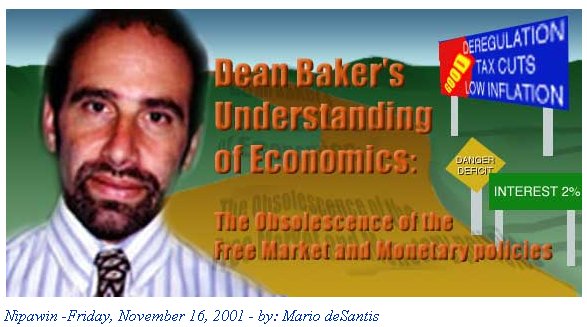Learning Stories
by
Mario deSantis
mariodesantis@hotmail.com
“I am a Canadian, free to speak without fear, free to worship in my own way, free to stand for what I think right, free to oppose what I believe wrong, and free to choose those who shall govern my country.” - -The Rt. Hon. John Diefenbaker, Canadian Bill of Rights, 1960
“The whole judicial system is at issue, it's worth more than one person.”--Serge Kujawa, Saskatchewan Crown Prosecutor, 1991
“The system is not more worth than one person's rights.”--Mario deSantis, 2002
Ensign Stories © Mario deSantis and Ensign
|
|
Alan Greenspan, chairman of the US Federal Reserve Board, is being portrayed as the guru who drives the American economic engine, and the magic used by this guru is the manipulation of the central bank's interest rate. It is a myth that the central bank' interest rate is the driver of any economy and today, November 16 2001, at the time this US interest rate is at a 40-year low of 2 percent, everybody would agree that the setting of interest rate by the central bank has little to do in stimulating the economy. Just imagine what would happen if the central bank's interest rate would be below zero, the borrowers would be making money rather than the banks. What I want to say is that we have been studying our economic policies under the Roman Empire's Principle of "ceteris paribus," that is, given that all things are what they are today, than one small change to only one thing (out of all the things) would provide a given additional overall benefit or loss. We must break down this imperial "ceteris paribus" approach which has been commonly defined as "linear thinking." And I have found out that US economist Dean Baker is doing an outstanding job in writing one paper after another as he breaks down this "ceteris paribus" approach of our conventional economists. I firstly came across Dean Baker's work as I was reading some articles written by Canadian economist Brian MacLean of the Laurentian University. I am not a specialized economist, however I subscribe to the understanding that we must use system thinking and dynamic system modeling to conceptualize and resolve democratically our social and economic challenges. In this respect, our understanding of economics is moving away from the so-called neoclassical economics of the Free Market, and Australian economist Hugh Stretton has just written a book in introductory economics where, finally, history, common sense and philosophy have become integral parts of the social science of economics. Dean Baker's relentless work highlights our conventional misconceptions of economics and I want to reiterate the need for changing our present understanding of economics, especially so when we have people like Walter Robertson of the Canadian Taxpayers Federation peddling tax cuts and balanced budgets across Canada and in our homes, in our businesses and in our politics. Therefore, I am going to briefly refer to some statements describing how economist Dean Baker assesses his understanding of the American economy, and this understanding is so much different from the present understanding of economics in the calcified minds of Walter Robertson, Finance Minister Paul Martin and Governor of the Bank of Canada David Dodge. These are some excerpts from the paper "THE NEW ECONOMY GOES BUST: WHAT THE RECORD SHOWS" by Dean Baker, and for further understanding please refer to the excellent economic site managed by the Center for Economic Policy and Research. **The unemployment rate fell far below the widely accepted estimates of the non-accelerating inflation rate of unemployment (NAIRU). In spite of more than seven years of below-NAIRU unemployment rates, the inflation rate has been remarkably stable. Prior to 1994, most economists predicted that such low rates of unemployment would lead to a substantial increase in the rate of inflation. This experience is a decisive refutation of the NAIRU theory... **At its peak in the first quarter of 2001, the ratio of the price of all corporate equities to after-tax corporate profits was over 31 to 1. This is more than twice the historic average of less than 15 to 1.... This bubble implied more than $9 trillion in illusory wealth... **The late nineties also saw a large run-up in the value of the dollar, which led to a substantial increase in the size of the U.S. trade deficit. At the peak of the cycle in 2000, the trade deficit reached 3.7 percent of GDP, while the nation's net foreign borrowing hit $440 billion. Deficits of this magnitude are clearly not sustainable... **To reverse the trade deficit, it will be necessary for the dollar to decline substantially against other major currencies... **While it is politically popular to balance the budget and pay off the debt, the economic benefits from these policies are quite limited. Economists recognize that the nation can run modest budget deficits (2.-2.5 percent of GDP, or $200-$250 billion a year), indefinitely... **The stock-market-driven consumption boom of the late nineties, with its dependence on massive foreign borrowing, was unsustainable, even though the nation was paying off the national debt. In contrast, a scenario in which the country continues to run modest budget deficits, but the debt to GDP ratio remains constant or falls, can be sustained forever. It will take some serious political leadership to make the public aware of these facts... Some references Pertinent articles published in Ensign THE NEW ECONOMY GOES BUST: WHAT THE RECORD SHOWS, by Dean Baker, October 29, 2001, Center for Economic Policy and Research http://www.cepr.net/new_economy_goes_bust.htm Maverick spans great divide, Alex Millmow, review of the book "Economics: A New Introduction" by Hugh Stretton http://www.btinternet.com/~pae_news/Stretton2.htm MacLean's Economic Policy Page, By Brian MacLean http://www.geocities.com/wallstreet/8691/ |
